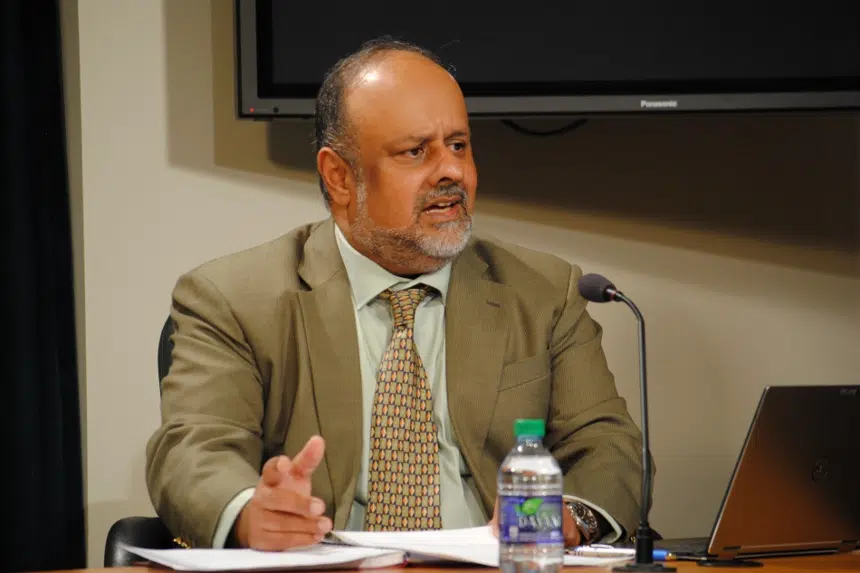Saskatchewan’s goal of limiting community transmission of COVID-19 could get a serious test as more travellers return to the province.
On Wednesday — when the provincial government revealed there were 14 new confirmed cases in Saskatchewan, bringing the total to 86 — the province’s chief medical health officer said the residents who return must do their part.
“We will see more people returning who can and should return to Canada, so because of that, we’ll see a proportion of people who are returning test positive,” Dr. Saqib Shahab said during a media conference at the legislative building. “As long as they are self-isolating for two weeks, we should see no further transmission in the community.”
As of Wednesday, four of the cases in Saskatchewan were the result of community transmission. That was the same number as Tuesday.
Shahab said there will be an increase in cases due to household contact with travellers who test positive, as family members or friends themselves test positive. If those people also self-isolate, that could help limit the spread of the virus.
As well, two mass gatherings — a dental conference in Vancouver and a curling bonspiel in Edmonton — have resulted in 16 cases in Saskatchewan.
But the province has put restrictions on the size of gatherings, so the hope is that those moves also will keep COVID-19 from spreading.
Shahab said four of the 86 cases are hospitalized, with two in intensive care units and two in acute care. It’s unclear if the hospital cases are related to COVID-19 or to underlying medical conditions.
“This is a number that will keep changing because experience from other Canadian jurisdictions has shown that most people have mild symptoms, they do well at home and after a period of two weeks, they’ve cleared the infection,” Shahab said.
“Some require a short period of hospitalization, which will be as little as less than a week and then they can come home and stay at home until they’ve cleared the infection. A few may require a longer hospital stay or ICU care.”
Four of the province’s cases are 19 years of age or under, 69 are between the ages of 20 and 64, and 13 are 65 years and older.
So far, 6,270 COVID-19 tests have been done by the Roy Romanow Provincial Laboratory.
The province announced new restrictions Wednesday on the maximum size of gatherings and on which businesses can remain open during the pandemic.
Combined with other restrictions already in place on travellers and on businesses, the hope is that the spread of the virus can be limited.
“Every one of you is part of a massive civil defence effort to protect our people, to protect our families and to protect our province unlike anything most of us have seen in our lifetime,” Premier Scott Moe said. “We are asking a lot, but it is necessary and it will reduce the risk.”
Ministry of Health adding help
The government said the Ministry of Health is speaking with licensing bodies in hopes of bringing recently retired health professionals into the workforce to help as the pandemic gets worse.
Registered nurses, licensed practical nurses, laboratory and diagnostic technicians and others are being recruited.
Flight information online
All domestic flights that had a confirmed case of COVID-19 on board are now listed online under Travel Information.
Travellers are encouraged to check the page frequently.
Toll-free line launched
The Saskatchewan Public Safety Agency (SPSA) has launched a toll-free phone line for people who have non-health-specific questions about COVID-19.
The number — 1-855-559-5502 (or 306-787-8539 for Regina residents) — is to be staffed from 6 a.m. to 10 p.m., by operators.
“We expect this new line to free up room for 811 health-care professionals to reach more people who may be experiencing medical issues,” SPSA president Marlo Pritchard said in a media release.
The government’s website also is a source of information about the pandemic.
Union raises concerns
One of the unions that represents health-care workers in the province issued a media release Wednesday blasting the provincial government over its plans to fight the virus.
The SEIU-West called the plan “deficient.”
“This government continues to display a lack of comprehension about the challenges faced by our members daily in the provision of health care services,” union president Barbara Cape said in the release.
Cape noted that the government’s requirements for social distancing is the main way to protect people in the province. That said, she added that health-care workers have pointed out “stark inconsistencies” in the facilities in which they work.
The union said its members aren’t sure if they’re supposed to self-isolate and what steps to take with personal protective equipment like masks and gloves.
“They have identified a need for clear communication and robust safety protocols that provide a level of confidence to our members,” Cape said. “Now more than ever, we need to listen to our front line workers.”







